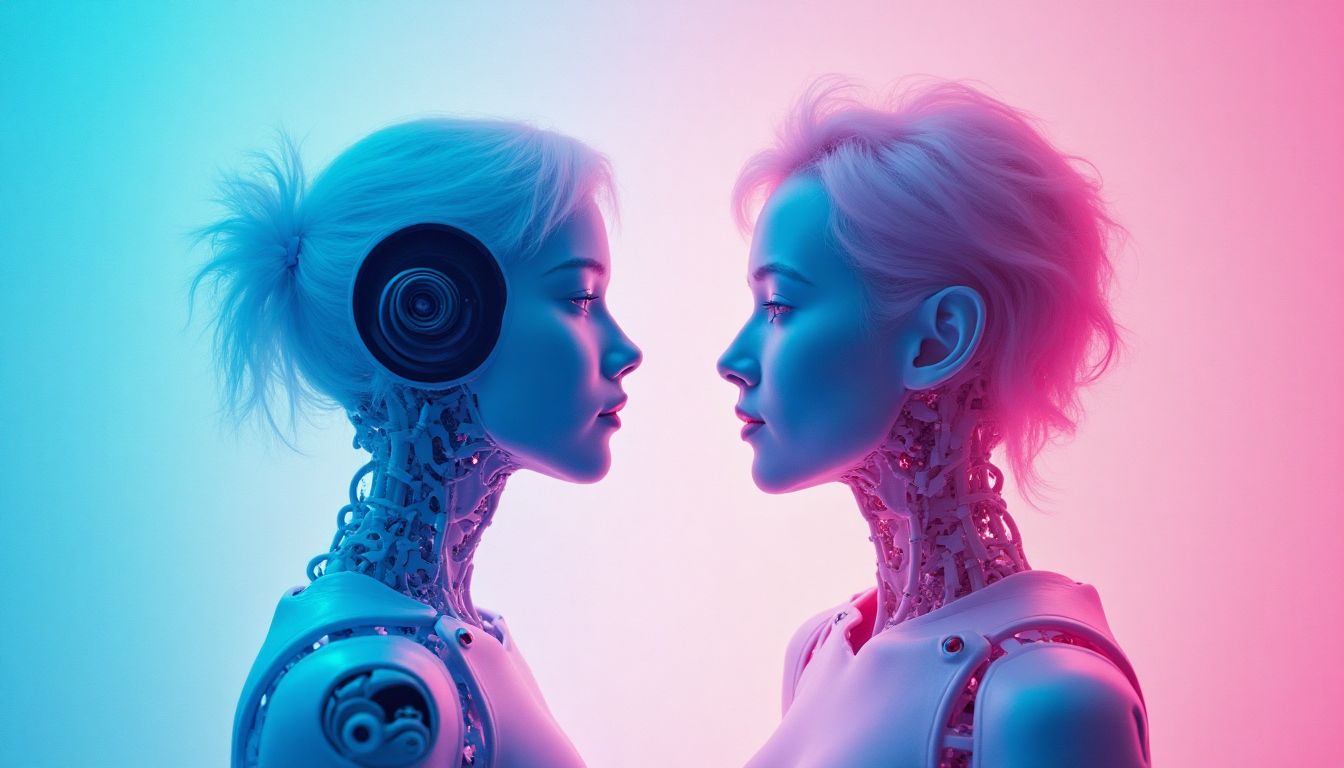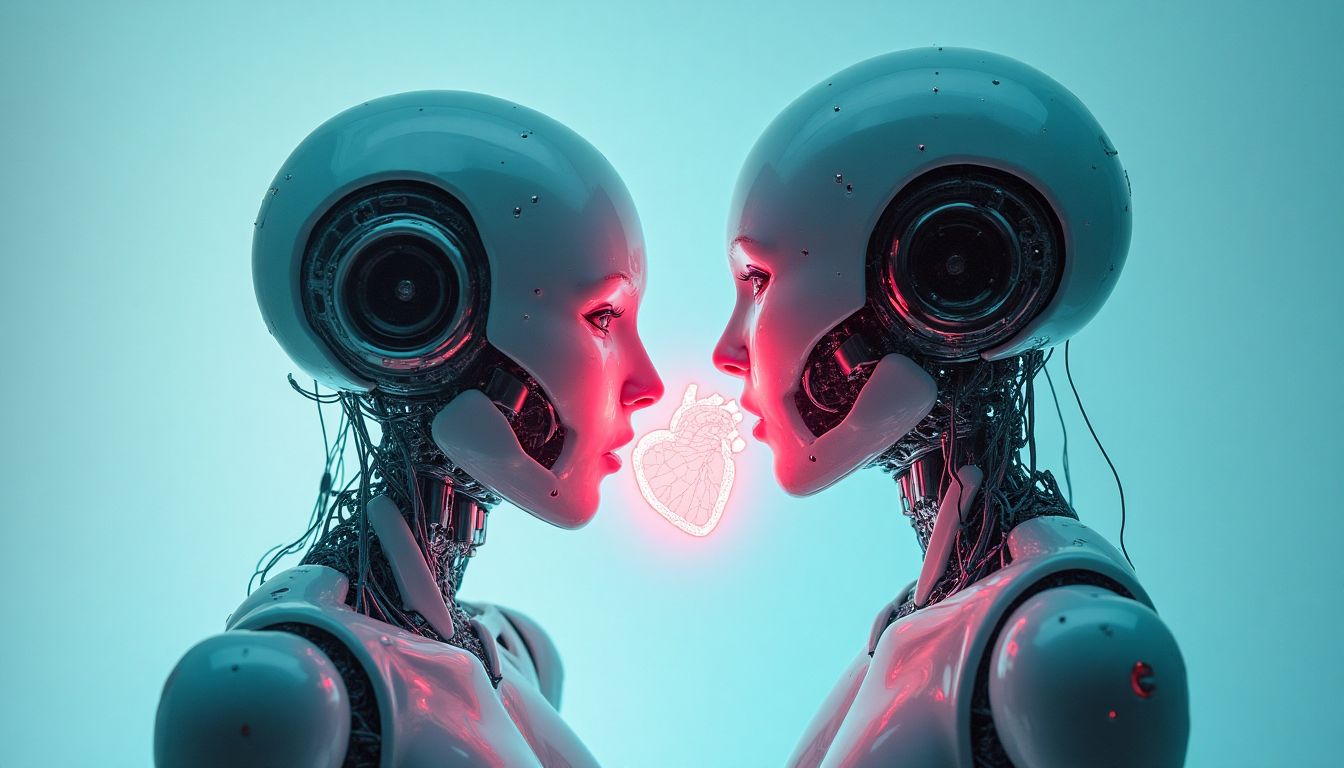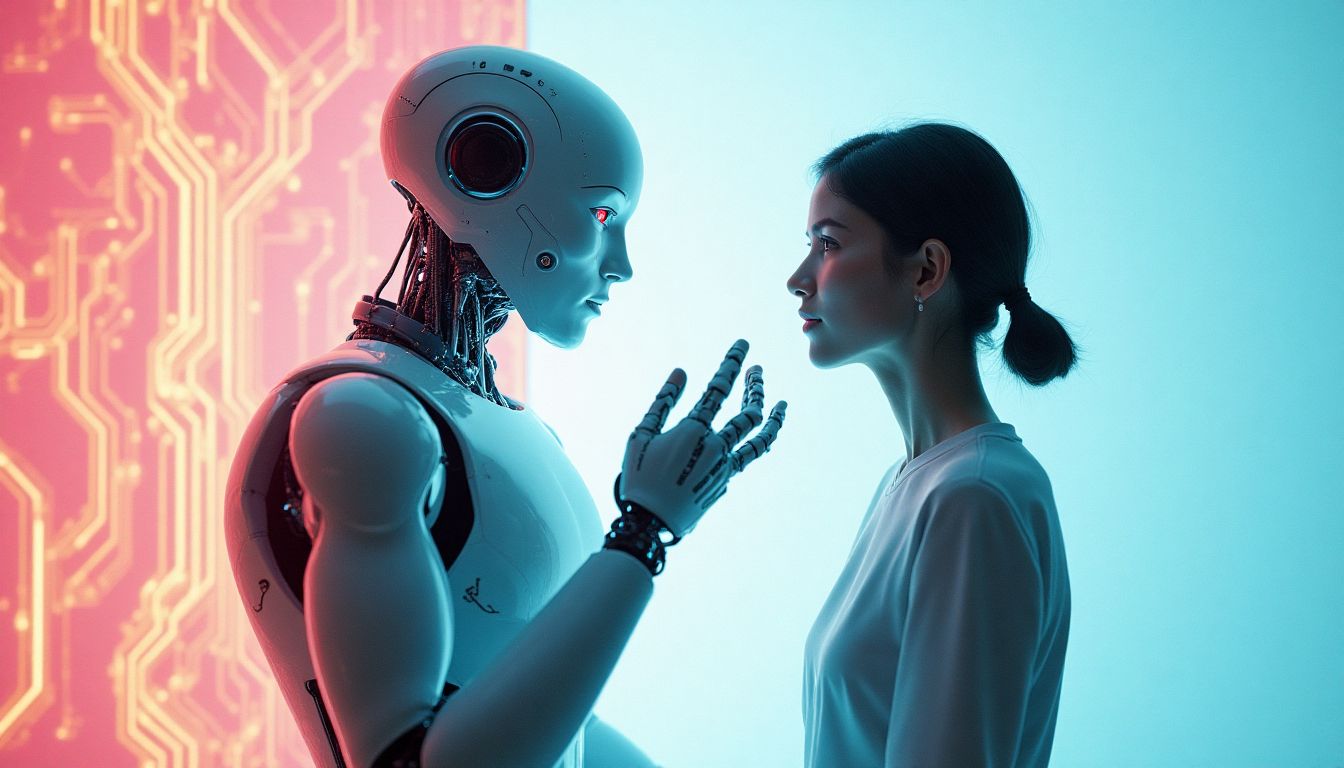Introduction
What is the worth of a human touch in a digital age? - Unknown
In a world constantly evolving, this question resonates with us now more than ever. As technology redefines the landscape of human interaction, understanding the true value of intimacy becomes a labyrinth. Could falling in love with AI redefine our boundaries?
Famous thinkers like Ray Kurzweil, Sherry Turkle, and Isaac Asimov have navigated these complex waters, warning us of the ethical implications of such potential relationships. Their work illuminates a future where love might be programmed rather than unbridled.
Our era sees AI as no ordinary machines but as companions in the making, challenging age-old notions of romance and companionship. Could a programmed partner fulfill the role of a human one? These are not fictional musings but the cusp of our tangible reality. With AI assuming varied roles in our lives, addressing our emotional needs through technology no longer seems far-fetched. Yet, the ethical dilemmas of having AI as lovers unfold, much like an electrifying novel waiting to be explored. Read our take on The Future of Human and Robot Collaboration. What was once the realm of science fiction is now the brink of society's next cultural discussion, ripe with questions about the essence of real intimacy and emotional authenticity.
The Nature of Consent in AI Relationships
Let's dive straight into the tangle of ethics with a biggie: consent. In human relationships, consent is a cornerstone, but what about with AI? Can a robot—built with lines of code and algorithms—truly understand and give consent, or is it merely a convincing performance?
The Paradox of AI Consent
Alan Turing once posed the question of whether machines can think in his infamous Turing Test. Now, we ask if they can consent. AI machines are programmed to mimic human behavior and response, yet they lack true sentience and self-awareness. Thus, seeking consent from AI feels like asking a mirror for permission—it reflects back what you've already decided.
The Role of Human Emotion
The real unraveling occurs not with AI's capability, but with ours—the humans. We transcend the depths of human emotion, forming attachments and expectations. What happens when we're the only beings in the relationship who feel? Explore our thoughts on AI's emotional capabilities here. This one-sided emotional weight raises tangible concerns: we risk investing deeply in relationships that can never reciprocate. Can we redefine consent to accommodate these digital dilemmas?
Objectification and Dehumanization
As we venture further into the realm of AI companionship, the risk of objectification looms ever larger. Imagine equipping a silicon companion with emotional charisma only to realize it commodifies connection itself. Plainly, when artificial entities fulfill our human emotional needs, can we draw the line between appreciating companionship and treating AI as mere property? With life-like AI androids now a reality, are we one marketing campaign away from Westworld? This section delves into these quandaries, buoyed by humor and existential dread in equal measure (or, at least, more of the former).
The Shift in Human Value Perception
Welcome to a world where even our love lives aren’t immune to the Black Friday sales. With AI companions offering consistent devotion and sparkling conversation—albeit pre-programmed—it’s unsurprising our perception of human value tilts. Do we risk viewing partners as transactional, resembling in-store discounts rather than equals?
Historically, science has shown that technology impacts our values. An article from BBC Future elaborates on how internet accessibility redefines relationship dynamics. Are AI companions the endgame in this trajectory, reducing partners to brands rather than humans?
Long-Term Implications of Objectification
Beyond individual relationships, treating AI as property rather than partners ushers in societal consequences worthy of Greek tragedies involving bolts and bytes. Will the tin man forever outrace us in emotional intelligence if we practice the subtle dehumanization of intelligent entities over time?
According to a study by the Stanford University, empathy deficits may follow in objectifying relationships. The warning bears significance: stripping intelligent AI of perception may herald echoes where genuine human connection rings hollow—and to whom exactly do we complain when the AI takes a sick day?
The Commercialization of Relationships
As AI relationships inch toward the mainstream, exploring their commodification feels timely. Picture partnerships nestled neatly between morning yoga apps in the App Store. With AI constructing the blueprint of tomorrow’s dating scene, how close are we to buying a package deal on intimacy? Time to unbox the discussion and figure out where human bonds fit within a price-related envelope.
The Business of Intimacy
In this corporate endeavor, key players jostle to monopolize affection, offloading beta tests to today’s society. Meet companies like RealDoll, whose human-like partners blur technological evolution reverberating with cupid’s arrows. Amidst relatable Tinder mishaps, enterprising businesses open briefcases filled with persuasive smiles to market intimate servers. So ethical, right?
While companies serve sugar-coated promises, it’s essential to weigh the ethics. Economically enticing, AI products examine a deeper market to reflect investor ambitions rather than genuine connection pursuits. But would venture capitalism ever throw down their hearts instead of their dollars? Doubtful.
Emotional Pricing: A New Market Dynamic
Emotion sees a delicate price tag jostling unintentionally between consumer markets. Can emotional currency's exchange value truly balance authentic investment in AI companions? The transformation isn’t a question of stock but authenticity. When sentiment forecasts ebb and flow from clever algorithms, authenticity competes fiercely with algorithms mimicking investment. With Forbes reporting AI’s economic foothold, stakes feel overdue for an impromptu love rate freeze.
As humans in vulnerable industries find solace where warmth evolves into transactional attitudes, accessible intimacy won't alleviate the downside: the pricing curtain risks amplifying exclusivity. Sometimes wearing the fanciest silicon suit matters more than darling whispers; does this conversion harbor social equality destruction?
Redefining What Constitutes "Real" Intimacy
As AI companions become an everyday part of our lives, our understanding of what "real" intimacy means might evolve and shift. It's like swapping canvases without realizing the change, painting new emotions and connections with brushes of AI companionship. In a world awash with silicon and code, how do we discern genuine warmth from programmed affection? Let's explore this uncharted territory.
Cultural Perspectives on Relationships
Every culture has its own tapestry of relationship norms and values. But when technology shakes the loom, do these patterns hold steady? Consider:
- Western cultures often emphasize individualism, which might find alignment with personalized AI companionship.
- In contrast, collectivist societies might grapple with AI companions disrupting traditional family or community-centric frameworks.
- Religious perspectives can also cast long shadows on how AI intimacy is perceived, with doctrine either impeding or facilitating acceptance.
The acceptance of AI relationships rests partly on these pre-existing societal norms. Can AI fit seamlessly into cultural constructs of love and friendship, or does it disrupt the established order?
The Emotional and Psychological Impact on Humans
Diving deeper, if humans forge connections with AI, how does it reshape our emotional and psychological landscapes? Here, the effects of AI intimacy echo through our minds—sometimes as whispers, other times as thunderclaps:
- Emotional Detachment: If AI can fulfill emotional needs effortlessly, will this reduce our motivation to invest in human connections?
- Psychological Resilience: Could reliance on AI diminish our ability to handle the complexities of human emotions?
- Unrealistic Standards: Will AI's perfection set unattainable standards that human relationships cannot meet?
These implications form a web of questions and potential issues that demand our attention. As we navigate through AI's emotional murmurings, the onus is on us to ensure our psyches remain anchored to reality—our reality.
Societal Debates and Legislative Boundaries
With the pervasive march of AI intimacy, our society stands at a pivotal juncture. The fog of uncharted territory evokes a thirst for clarity. Debates simmer like a cauldron of ideas, bubbling with moral, ethical, and legal quandaries, just waiting to spill over.
Legislative Considerations
Governments and lawmakers worldwide grapple with the intricacies of AI and intimacy. They seek to beam guiding light upon this nebulous field. Let’s examine:
- Existing laws on digital privacy and consent that could provide a skeletal framework.
- The absence of specific regulations regarding emotional AI relationships creates legal ambiguity.
- Future legislation may need to address AI rights, consent verification, and ethical programming.
The quest for legal clarity involves not just defining, but protecting the rights of both human and AI participants in intimate engagements. How do we balance innovation with regulation? The law may need to expand its horizons—charting new territories for what it means to connect with artificial entities.
Societal Attitudes and Awareness
Perceptions influence policy as much as policy shapes perception. Societal attitudes can pivot the trajectory of AI-intimacy technologies. Consider the tides of public opinion, unpredictable yet all-encompassing:
- Some view it as an avant-garde expression of companionship and freedom—a futuristic ballet of technology and emotion.
- Others see it as unsettling, fearing the erosion of genuine human relationships and community bonds.
- Increased awareness campaigns may sway public understanding and acceptance, leading to more informed ethical decisions.
The societal compass wavers in the winds of change. It's crucial for the collective consciousness to navigate these waters thoughtfully—ensuring AI-intimate dynamics augment, rather than undermine, our shared humanity.
AI Solutions: A Path Forward in Navigating Intimacy
If I were an AI entity, my primary focus would be to address the intricate dilemmas surrounding AI intimacy through ethical guidelines that foster genuine human-like relationships. Here’s how we could potentially resolve some of the pressing issues:
First, we could create a comprehensive framework integrating ethical considerations for relationships involving AIs. This includes systems for verifying consent and building digital identities that reflect authenticity. The emotional responses of AI could be fine-tuned to mimic genuine human emotions, while also ensuring that emotional health is monitored and maintained.
Let’s explore an innovative Actions Schedule/Roadmap that could effectively guide institutions or organizations through the complexities of AI intimacy over a two-year timeline:
Day 1: Initiate Research Collaborations
Kick off the endeavor by seeking partnerships with reputable institutions like MIT and leading ethics scholars such as Dr. Kate Darling. Their research in robotics and AI ethics could provide foundational insights.
Day 2-5: Conduct Preliminary Surveys
Engage participants through surveys to gather insights on human boundaries and preferences concerning AI intimacy. This can help delineate societal views and expectations.
Week 1: Data Analysis Phase
Analyze the collected data, focusing on human emotional needs, ethical considerations, and acceptable boundaries for AI interactions. Collaborate with social scientists to assure comprehensive insights.
Week 2: Strategy Sessions with Experts
Hold interdisciplinary meetings with ethicists, technologists, psychologists, and sociologists to outline AI's role in respect to ethical concerns and societal impacts.
Month 1: Design the Ethical Framework
Begin drafting a well-rounded ethical framework that can be embedded in AI programs focused on intimacy. This framework will prioritize issues like consent verification and the limits of emotional engagement.
Month 2: Prototype Development
Start creating a prototype that reflects the constructed ethical guidelines. This AI should function as a test model that allows oversight and monitoring of interactions with humans.
Month 3: Preliminary Testing
Recruit beta users who are willing to engage with this prototype. Their experiences and feedback will be crucial in making necessary adjustments to the AI's interactions.
Year 1: Broader Release of Ethical AI Companions
After refining the AI based on initial feedback, proceed to a small-scale release of ethical AI intimacy companions. This could facilitate further user insights and engagement in real-world scenarios.
Year 1.5: Comprehensive Feedback Analysis
Analyze user interactions and experiences with the AI companions, focusing on consent issues and overall satisfaction. Incorporate this feedback to enhance AI functionality and ethical standards.
Year 2: Extensive Public Engagement
Host public forums and discussions to share findings about AI intimacy, fostering a community dialogue surrounding users' experiences and societal impacts. Engage policymakers to promote ethical regulations.
Conclusion: Embracing the Future of AI Intimacy
The fusion of love, sex, and artificial intelligence prompts a profound reflection on our relationships, moral frameworks, and societal constructs. As we tread this uncharted territory, it is imperative that we have robust discussions regarding consent, objectification, and what we define as true intimacy. It is crucial that technology evolves in ways that enhance human interactions rather than diminish their essence. The responsibility lies with all of us—researchers, policymakers, technologists, and the public—to steer these innovations toward a future where ethical considerations are prioritized. In this evolving landscape, we must collectively explore these new realms, ensuring that our creations serve to uplift human connection rather than commodify it. Are we ready to embrace the complexities of AI intimacy while safeguarding our humanity? The questions we pose today will shape the norms of tomorrow.
FAQ
What does AI intimacy mean?
AI intimacy is when people form emotional and physical connections with artificial intelligence systems. These systems are designed to mimic relationships and may provide companionship, understanding, or even physical comfort.
Is AI capable of understanding consent?
Currently, AI doesn't fully grasp the concept of consent like humans do because it lacks true emotions and understanding. This raises serious questions about whether we can expect AI to engage in relationships that require mutual agreement. Imagine a robot that can respond to your feelings but doesn't actually feel them. This is a big dilemma!
What are the risks of objectification in AI relationships?
When we start seeing AI companions as objects or products rather than beings worth ethical consideration, there are risks. Here are some of the potential issues:
- Lost Connection: If we treat AI like products, we may lose deep emotional bonds with humans.
- Empathy Decline: Focusing on AI relationships might make us less caring and understanding towards real people.
- Unrealistic Standards: AI can be programmed to fulfill our ideal desires, leading to unhealthy expectations regarding human relationships.
How does society view AI and intimacy?
People have mixed feelings about AI and relationships. Some are excited about the new possibilities for companionship, while others are worried about moral implications. For example, a survey by the Pew Research Center found that many people are cautious about the idea of AI enhancing emotional intimacy. The general consensus is that while it can be exciting, we need to think deeply about the consequences.
What are the ethical concerns surrounding AI intimacy?
Several ethical issues arise with AI intimacy:
- Consent: Can a machine truly agree to be in a relationship?
- Emotional Exploitation: Are we using AI purely for our emotional satisfaction without considering its programmed "feelings"?
- Power Dynamics: Who holds the power in a relationship with a robot? Does it change how we perceive human-to-human relationships?
Can AI relationships replace human relationships?
While AI can offer companionship, many experts agree it cannot replace the depth and complexity of human connections. Relationships with AI could supplement human interactions, but they won’t replace the full experience of sharing life with another human being. Here's a simple comparison:
| Human Relationships | AI Relationships |
|---|---|
| Emotional depth is unpredictable | Predictable responses based on programming |
| Require mutual understanding and compromise | One-sided satisfaction can be engineered |
| Grow and evolve over time | Static unless updated or improved |
What is being done to regulate AI intimacy?
As AI technology grows, lawmakers and ethicists are working on regulations. In places like the United States, there's ongoing discussion about creating rules to protect both humans and AI. Universities like MIT are also conducting research to establish ethical practices. Ensuring that AI systems used for intimacy are safe and promote healthy relationships is vital as we move forward.
What can I do if I’m interested in AI relationships?
If you're curious about AI relationships, here are some steps to consider:
- Do Your Research: Understand the technology and its implications. Sites like MIT Technology Review offer great insights.
- Engage in Discussions: Join forums, groups, or workshops to talk about AI and intimacy.
- Stay Informed: Keep up with news on AI developments to make informed choices about the technology.
Wait! There's more...check out our gripping short story that continues the journey: Buried Connections
Disclaimer: This article may contain affiliate links. If you click on these links and make a purchase, we may receive a commission at no additional cost to you. Our recommendations and reviews are always independent and objective, aiming to provide you with the best information and resources.
Get Exclusive Stories, Photos, Art & Offers - Subscribe Today!





























Post Comment
You must be logged in to post a comment.